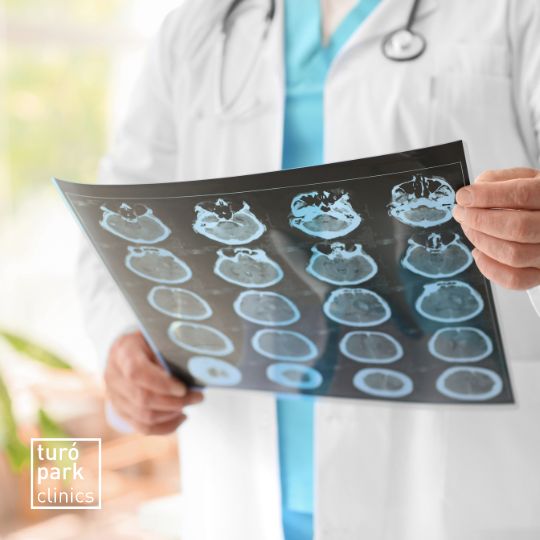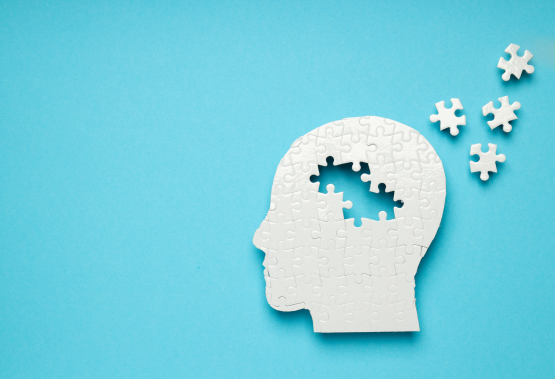Are you looking for a specialist in cognitive and memory disorders?
Cognitive and memory disorders are conditions that affect essential functions of the brain. They vary in severity and can be mild, affecting only day-to-day living, or severe, limiting a person's independence.
Because of the variability of these disorders, it is crucial to diagnose them as early as possible in order to manage them more effectively. Early detection and proper diagnosis is crucial to manage and treat these disorders, not only benefiting the patient, but also their family and caregivers, improving their quality of life and making the impact of these disorders more bearable.
What are these disorders?
Cognitive and memory disorders are conditions that affect a person's ability to think, remember and process information effectively.
The causes can be diverse, including neurodegenerative diseases such as Alzheimer's, brain injuries, strokes, infections, nutritional deficiencies, and psychiatric conditions.

What are the most common cognitive disorders?
- Dementia - the general term for cognitive impairment severe enough to interfere with daily life. It is not considered a specific disease, but a syndrome caused by several diseases that can affect any area of the brain. There are several diseases that are considered both a type and a cause of dementia such as Alzheimer's disease, dementia with Lewy bodies, vascular dementia and mixed dementia (combination of two or more types of dementia). Its most common symptoms are memory loss, communication problems, disorientation or changes in behaviour and personality.
- Mild Cognitive Impairment (MCI) - is considered an intermediate state between normal cognitive ageing and dementia, as it causes patients to suffer from memory problems that are more pronounced than normal for their age. It usually does not interfere with daily life and patients can lead a full and normal life. However, people with this cognitive disorder are more at risk of developing more severe dementia.
What are the causes of these disorders?
The causes vary depending on the disorder.
Alzheimer's disease, dementia with Lewy bodies or Parkinson's disease are the most common causes of cognitive memory disorders.
Such as vascular dementia, which causes problems with blood flow and blood supply to the brain, often due to multiple mild strokes.
Severe traumas and injuries to the head may involve brain damage, which can lead to amnesia, memory problems and cognitive impairment.
Alcohol and drug abuse is a direct cause of cognitive decline as it is capable of altering the structure of the brain and causing loss of brain volume, shrinkage and death of neurones, reduction of grey matter and brain atrophy.
Highly stressful or traumatic events can induce amnesia or anxiety disorders.
Normal ageing involves deterioration of cognitive functions, however, good general health, an adequate level of physical and mental activity and a balanced diet can reduce the risks of developing impaired cognitive function.
How is the diagnosis of cognitive and memory disorders carried out at Turó Park Clinics?
The diagnosis of cognitive and memory disorders is a multidisciplinary process that varies depending on the type of disorder to be assessed. However, the process will be similar in all cases.
The first visit should take place with a neurologist, who will conduct a review of the patient's complete medical history and a thorough assessment of memory and cognition symptoms. Following the visit, the specialist may order specific complementary tests to perform a complete cognitive assessment for each disorder.
Some of the common neurological tests to diagnose cognitive disorders include magnetic resonance imaging (MRI) or PET scans, tests of specific memory and cognitive functions, or a Mini-Mental State Examination (MMSE) to assess general mental status.
In addition, it is common to perform blood or cerebrospinal fluid tests to rule out or confirm the presence of neurodegenerative diseases.
Who is recommended for a cognitive screening?
The recommendation for a cognitive screening is based on factors such as symptoms, age, risk factors and medical history.
It is indicated for people who have:
- Memory problems
- Language difficulties
- Problems with orientation and functional skills
- Changes in behaviour or personality
- Age over 65 years
- Close relatives diagnosed with dementia
- Severe head trauma
- Partial or total loss of memory after a traumatic event
Your health is our priority!
Our neurology department welcomes you for the diagnosis and treatment of cognitive and memory disorders.

Our specialist
